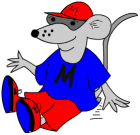
The Primary Framework for Mathematics would suggest that adding two single digits should always be done ‘in your head’ as children are expected to know them. However, parents like to see some written confirmation, and many children love doing a page of written sums, so we will start with a two straight forward ‘adding 5 to a single digit’ worksheets. All answers are only up to 10. Continue reading “Addition worksheet: adding 5 to a single digit”
 This maths worksheet is an introduction to the investigative approach to mathematics. It is concerned with children using their knowledge to solve problems and puzzles, find patterns, make generalisations and begin to predict.
This maths worksheet is an introduction to the investigative approach to mathematics. It is concerned with children using their knowledge to solve problems and puzzles, find patterns, make generalisations and begin to predict. The last in this particular sequence of type of question, once again concentrating on place value and the knowledge that addition and subtraction are inverse.
The last in this particular sequence of type of question, once again concentrating on place value and the knowledge that addition and subtraction are inverse. Continuing with our numbers word searches this looks at numbers mainly in the whole tens. Quite tricky as there are so many ‘ty’s in the wordsearch!
Continuing with our numbers word searches this looks at numbers mainly in the whole tens. Quite tricky as there are so many ‘ty’s in the wordsearch!